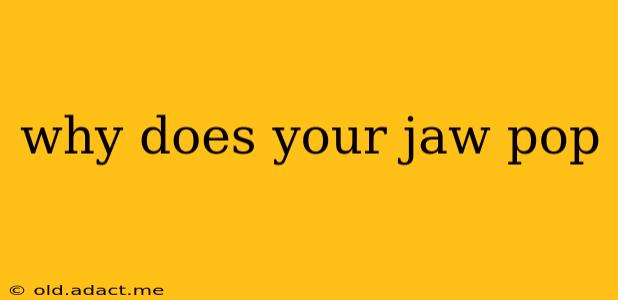A popping jaw can be unsettling, but it's a relatively common experience. Understanding the reasons behind this clicking or popping sound is crucial for addressing any underlying issues and preventing potential problems. This comprehensive guide explores the causes, symptoms, and treatment options for a popping jaw, often associated with temporomandibular joint (TMJ) disorders.
What Causes a Popping Jaw?
The most frequent cause of a popping jaw is a problem with your temporomandibular joint (TMJ). This joint connects your jawbone to your skull, allowing you to open and close your mouth, chew, and speak. Several factors can lead to TMJ disorders, resulting in that characteristic popping sound:
-
Disc Displacement: The TMJ contains a disc that acts as a cushion between the bones. If this disc is displaced or moves out of its normal position, it can cause a popping or clicking sound as the jaw moves. This is often the primary reason for jaw popping. The displacement can be anterior (forward), posterior (backward), or medial/lateral (side to side).
-
Ligament Issues: The ligaments surrounding the TMJ provide stability. If these ligaments are stretched or torn, they can contribute to joint instability and popping.
-
Arthritis: Degenerative joint disease, such as osteoarthritis or rheumatoid arthritis, can affect the TMJ, causing inflammation, pain, and popping.
-
Muscle Spasms: Overuse or stress can lead to muscle spasms in the jaw muscles, which can cause the jaw to pop or click.
-
Jaw Injuries: Previous injuries to the jaw, such as fractures or dislocations, can lead to long-term TMJ problems and popping.
-
Poor Posture: Maintaining poor posture can affect the alignment of the jaw and contribute to TMJ problems.
What are the Symptoms of a Popping Jaw?
While the popping sound itself is a prominent symptom, other indicators might accompany it, signaling a potential TMJ disorder:
- Pain: Pain in the jaw, temples, or face is a common symptom. The pain can range from mild discomfort to severe, debilitating pain.
- Limited Jaw Movement: Difficulty opening or closing your mouth fully.
- Jaw Locking: In some cases, the jaw may lock in an open or closed position.
- Clicking or Grinding Sounds: Beyond popping, you might hear clicking or grinding noises in your jaw joint.
- Headaches: TMJ disorders can often lead to headaches, particularly tension headaches.
- Earaches: Pain in the ear or a feeling of fullness in the ear can also occur.
How is a Popping Jaw Diagnosed?
A dentist or oral surgeon specializing in TMJ disorders can diagnose the problem. Diagnosis typically involves:
- Physical Examination: The doctor will examine your jaw joint and assess your range of motion.
- Imaging Tests: X-rays, CT scans, or MRIs may be used to visualize the TMJ and surrounding structures.
What are the Treatment Options for a Popping Jaw?
Treatment for a popping jaw depends on the severity of the condition and its underlying cause. Options range from conservative approaches to more invasive procedures:
- Conservative Treatments: These are often the first line of defense and may include:
- Over-the-counter pain relievers: Ibuprofen or acetaminophen can help manage pain and inflammation.
- Heat or cold compresses: Applying heat or cold packs to the jaw can provide relief.
- Soft foods: Eating soft foods reduces stress on the TMJ.
- Stress management techniques: Stress reduction techniques like yoga, meditation, or deep breathing exercises can help relax jaw muscles.
- Mouthguards or splints: These devices can help realign the jaw and protect the TMJ.
- More Invasive Treatments: If conservative treatments fail, more invasive options may be considered:
- Physical therapy: A physical therapist can teach you exercises to strengthen the jaw muscles and improve jaw mobility.
- Corticosteroid injections: Injections of corticosteroids can help reduce inflammation.
- Surgery: Surgery is rarely necessary but may be considered in severe cases of TMJ disorders.
Does a Popping Jaw Always Indicate a Problem?
Not always. A mild, occasional popping sound in the jaw might not indicate a significant problem. However, if the popping is accompanied by pain, limited jaw movement, locking, or other symptoms, it's crucial to consult a healthcare professional for a proper diagnosis and treatment.
When Should I See a Doctor About My Popping Jaw?
You should see a doctor if your jaw popping is accompanied by pain, swelling, limited movement, locking, or any other concerning symptoms. Early intervention can often prevent the condition from worsening.
Can a Popping Jaw Be Prevented?
While not all cases are preventable, you can take steps to minimize your risk of developing TMJ disorders by practicing good oral hygiene, avoiding jaw clenching or grinding, maintaining good posture, and managing stress effectively.
This information is for general knowledge and does not constitute medical advice. Always consult with a healthcare professional for any concerns about your health.
